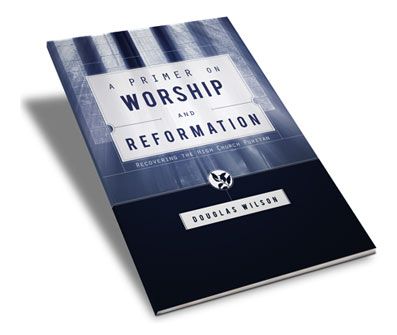Apr
10
2009
 Ecclesia reformata semper reformanda est.
Ecclesia reformata semper reformanda est.
“Reformed theology should be reforming theology, for the Church – finite, sinful, not yet fully glorified – always stands in need of God’s reformation, by his Spirit, through his Word taught, trusted, and obeyed. And so, Ecclesia Reformanda exists to assist the Church in the ongoing task of listening to Scripture in all its depth and richness. It will seek to be truly theological, distinctively Reformed, and prayerfully reforming.”
An “ongoing theological conversation” cannot be tolerated by the academy. James Jordan writes:
“We looked last time at the problem of academic theology. Systematic theology tends to become paramount, a “Greek” discipline that specializes in comparison and contrast… what the academic guards is not the woman, not the Bride, but rather ideas. Loyalty to ideas, and sometimes loyalties to the men who came up with the ideas, is more important than loyalty to the Church and to the Spirit. Does N. T. Wright not say things exactly they way Geerhardus Vos did? Then we might fight him. He must be put down. A spirit of churchly catholicity, of humility before the infinity of the Word and the long future of the church ahead of us, is simply absent, or certainly seems to be.
Continue reading
Comments Off | tags: Amillennialism, Federal Vision, N. T. Wright, Postmillennialism, Reformation | posted in Biblical Theology, Ethics
Apr
10
2009
Steve Kryger, in his article Thank The Porn Industry?, says the sex trade has been the driving force behind innovation on the internet.
Clearly, not all of these innovations have been good (as the article itself concedes). It doesn’t take a particularly web-savvy reader to work out which of these are ‘naughty’ (in the words of the author), and which are ‘nice’:
• Online payment systems
• Spam
• Streaming content
• Malware
• Live chat
• Pop-ups, pop-unders and mousetrapping
• Broadband
• Browser hijacking
• Traffic optimisation
• Domain-name hijacking
• 3G mobile services
• Paris Hilton
Christian ministry makes use of six of these twelve innovations (i.e. all of the ‘nice’ ones!).
He complains about the fact that the world comes up with the ideas (like YouTube) and the church just mimics them (GodTube). I would agree on this when it comes to our worship music and culture. But in a very real sense, this is the way God has worked in history and will always work:
“Enoch and Babylon are the first cities, but Jerusalem is the last. Jubal is the first musician, but David the “last”. The wicked get there first and do much of the work, laying up an inheritance for the just. Because they are not concerned with morality, the wicked can employ slave labour to build their cultures early, while a righteous culture takes longer to build.”1
To clarify my thought, it means we as God’s people will inhabit houses, towns, vineyards and software that we didn’t build.
1 James B. Jordan, Was Job an Edomite King?, BIBLICAL Horizons, No. 131,www.biblicalhorizons.com
Comments Off | tags: Culture, James Jordan, Postmillennialism | posted in Biblical Theology, Ethics
Apr
10
2009
Peter Leithart comments on Ian McEwan’s remembrance of Updike: The Flight of the Spirit.
Comments Off | tags: Culture, Peter Leithart | posted in Quotes
Apr
10
2009
In C. S. Lewis’ The Voyage of the Dawn Treader, we are given a good example of a boy who was brought up poorly. Eustace Scrubb had stumbled into a dragon’s lair, but he did not know what kind of place it was. “Most of us know what we should expect to find in a dragon’s lair, but, as I said before, Eustace had read only the wrong books. They had a lot to say about exports and imports and governments and drains, but they were weak on dragons.”
It is a standing rebuke for us that there are many Christians who have an open sympathy for the “true” books which Eustace read — full of true facts about governments and drains and exports — and who are suspicious of great works of imagination, like the Narnia stories, or The Lord of the Rings, or Treasure Island, because they are “fictional” and therefore suspected of lying. The Bible tells us to be truthful above all things, they tell us, and so we should not tell our sons about dragon-fighting. Our sons need to be strong on drains and weak on dragons. The irony here is that the Bible, the source of all truth, says a lot about dragons and giants, and very little about drains and exports.
–Doug Wilson, Future Men, p. 101.
Comments Off | tags: C. S. Lewis, Doug Wilson, Parenting | posted in Christian Life, Quotes
Apr
10
2009
The InternetMonk, Michael Spencer, has predicted The coming evangelical collapse.
Is it a bad thing?
“The sooner God destroys the world of evangelical gnosticism, the sooner authentic Christian churches can begin to do what we are called upon to do.”
James Jordan makes some good observations about evangelicalism in Obama as Fool.
And Doug Wilson has comments here:
“There are (at least) two kinds of disasters. One is when an asteroid lands on the most beautiful albaster-gleamy city we have. This is disaster straight up. Then there is the disaster revelatory — it was a disaster all along, and now we know about it… The coming evangelical collapse will be the disaster revelatory.”
God periodically shakes the Land so that the trash falls away. We need to read our Old Testaments.
Comments Off | tags: Conservatism, Evangelicalism | posted in Christian Life, Ethics
Apr
10
2009
Frank Turk comments:
Stop Asking Me
I gave kudos to iMonk for getting pretty much global recognition for his “death of Evangelicalism” piece, right? So credit where credit’s due and all that.
Many of you have e-mailed me to ask, “yeah, but what do you think about the essay?” Look: I’m not going to take the bait. The truth is that Michael and I get along pretty good as long as we don’t talk about things we blog about, and I’m really intent on keeping it that way as I have no free time to speak of.
That said, here’s what Doug Wilson thinks about that essay, and I would endorse without comment Doug’s affirmations and denials.
The problem is not that there’s too much conservatism: it’s that there’s a lot of unfounded, flabby conservatism running around with plastic fishes attached to it rather than a robust, young, and dangerous conservatism riding around on the fat, noisy Harley which is the Gospel.1
Now there’s an image.
______
1 http://centuri0n.blogspot.com/2009/03/stop-asking-me.html
Comments Off | tags: Conservatism, Evangelicalism | posted in Christian Life, Ethics
Apr
10
2009
I don’t really know why someone thought it was necessary to do a poll to see just who were the most disliked groups in society, but the results are in. While serial killers and IRS agents still come in last, hot on their heels are evangelical Christians. Not Christians in general. Not Roman Catholics. Not all Christians, but evangelical Christians…
My response to iMonk’s article, Why Do They Hate Us?
Continue reading
Comments Off | tags: Evangelicalism | posted in Apologetics, Christian Life, Ethics
Apr
10
2009
Mistake 1: Big is better than small.
God uses little David-like people to accomplish huge Goliath-like things because he is jealous to get the credit.
Don’t worry about big. Worry about faithful.
Mistake 2: New is better than old.
Read old books. You need the wisdom of the ages to combat the folly of the present.
When you read books from today, don’t read first and mainly books by emergent writers. Read books first and mainly by old men—J.I. Packer, R.C. Sproul—men with long battled years who have learned not only from the Bible and from books, but from life.
In school, it doesn’t matter what you major in. Just find the wisest teachers and take everything from them.
When great changes happen, it’s not from new ideas. The Reformation was a great leap forward precisely by going backward.
Mistake 3: Having is better than being.
There’s no correlation between the fullness of life and the muchness of having.
Don’t reduce your education to acquiring marketable skills. Study to become and behold, not to be rich.
Mistake 4: Visible is better than invisible.
The most important things are not visible. God is invisible and he is the greatest reality of all. If you structure your life around sight, it will be out of touch with reality.
Do not be much interested in outward appearance. Be interested in inner realities.
–John Piper
Comments Off | tags: John Piper, Reformation, Wisdom | posted in Christian Life
Apr
10
2009

The great argument advanced today in favor of such seeker sensitive worship is that we have to present the gospel to today’s unbeliever in a way that is relevant to him. But the word relevance, though it has a fine dictionary definition, really has to be understood as the battle cry of modern unbelief. This is not because the word itself is objectionable, but because liberals and their modern evangelical cousins have freighted it with a hidden system of weights and measures—in which the world, and not Scripture, determines the content of our faith and practice.
There are at least two kinds of irrelevance. One is the irrelevance of offering a bicycle to an oyster. But there is another kind of irrelevance entirely, and that is the practice of setting forth the gospel of light and righteousness to those who love their darkness and iniquity. We are commanded to be irrelevant in this second sense. We are called to worship God in a way that is pleasing to Him, and to which unbelievers will be attracted only if God moves them in a sovereign and mysterious way.
Read chapter 1, They Will Know We Are Christians By Our Schlock, here.
Comments Off | tags: Doug Wilson, Ecclesiology, Power of the Gospel, Worship | posted in Christian Life
Apr
10
2009

“Catholics do not worship idols, it would be a mortal sin if they did.”
Apparently there is a difference between veneration and worship? That is their argument.
I agree that the common argument against it is a bit weak, but James Jordan writes:
“This commandment is often misinterpreted as stating that no picture of God can be made. This is not what it says. What is says is that no image of anything can be set up as an avenue of worship to God and the court of heaven… Thus, the idea is not that of a “graven” image as opposed to a “molten” image or a “painted” image. The idea is that of a manmade graven object versus the God-made graven Word. The opposition is between God’s content-filled graven Words and man’s silentgraven images. The opposition of God’s verbal covenant and man’s graven images is set out in greater detail in Deuteronomy 4:15-31.”
Continue reading
Comments Off | tags: Church History, James Jordan, Roman Catholicism, Temple, Ten Commandments | posted in Biblical Theology, Ethics, The Restoration Era
 Ecclesia reformata semper reformanda est.
Ecclesia reformata semper reformanda est.


























